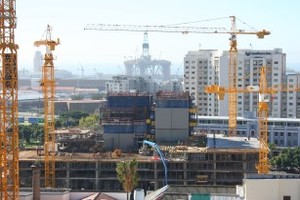- Tanzania Gives Go-Ahead to Massive Sh80.85 Billion Mbamba Bay Port Construction Project
- KeNHA Unveils Strategic Sh394 Billion Plan to Construct Major Highways in Kenya
- Ruto’s Multi-Million Plan to Host the 2027 Africa Cup of Nations (AFCON) Tournament in Kenya
- Tanzania's Modern Industrial Park Project on Course with 3.5 Trillion Investment
- African Development Bank Greenlights $696.41 Million for Phase 2 of Tanzania-Burundi-DRC SGR
- Biggest construction trade exhibition announced in Nairobi at KICC
- President Ruto's Vision of Affordable Housing Projects Taking Shape in Kenya
- Ethiopia Receives $720 Million in Funding for Road Construction Project
- $3.24 Billion to be Invested in Tanzania SGR Construction by Spain
- Ksh700 Billion to be Invested to Complete Pending Kenyan Road Projects
Construction outlook in South Africa is 'moderate'

Posted on : 21 Jun,2017
Buildmart is Africa's leading directory and market news website for the building and construction industry | Kenya | Tanzania | Rwanda | Ethiopia
Exhibitions In Africa
- 25th Buildexpo Kenya 2024
KICC, Nairobi, kenya
05 - 07, June 2024 - 09th Afriwood Kenya 2024
KICC, Nairobi, kenya
05 - 07, June 2024 - 09th LightExpo Kenya 2024
KICC, Nairobi, kenya
05 - 07, June 2024 - 08th Minexpo Africa 2024
KICC, Nairobi, Kenya
05 - 07, June 2024 - 25th Buildexpo Tanzania 2024
Diamond Jubilee Expo Center, Dar-es-Salaam, Tanzania
12 - 14, Sep 2024 - 08th Afriwood Tanzania 2024
Diamond Jubilee Expo Center, Dar-es-Salaam, Tanzania
12 - 14, Sep 2024 - 08th LightExpo Tanzania 2024
Diamond Jubilee Expo Center, Dar-es-Salaam, Tanzania
12 - 14, Sep 2024 - 08th Minexpo Tanzania 2024
Diamond Jubilee Expo Center, Dar-es-Salaam, Tanzania
12 - 14, Sep 2024





















